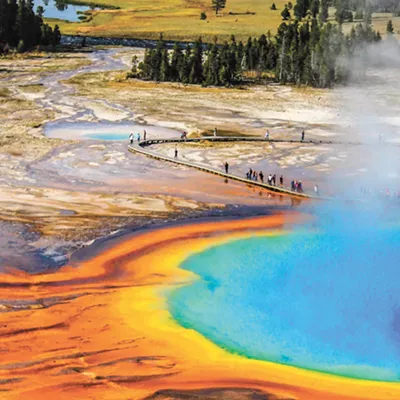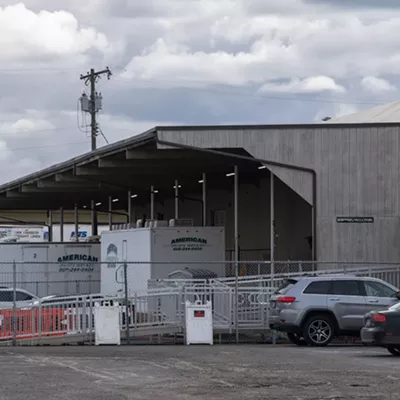It was a sight that seemed unfathomable at first to Julie Graham, spokeswoman for the Spokane Regional Health District. She had always believed that if people only knew -- if they only had access to the right information -- they would make good choices about their health. The reality of life in the slum, however, began to make her think otherwise.
"My assumption has always been that information is the answer," says Graham, who recently returned from a six-month assignment with the World Health Organization. "But just giving information isn't enough. It's a whole lot deeper than that."
While working for the WHO, Graham witnessed hundreds of children die in Cambodia as a result of dengue fever. In the Philippines, she saw people continue using water that had been contaminated by run-off from the floods. And in India, Graham watched with sadness as children foraged in garbage dumps along with cows, pigs and dogs. The experience changed her whole outlook.
People's behavior, she now says, doesn't depend solely on what they know; their attitudes and the risks they're willing to make also are influenced by culture, politics, economics and their place in the world.
In the United States, for instance, people continue to smoke, abuse drugs or drive without seatbelts -- despite the numerous studies and widely available information that show how those actions endanger a person's life.
Now, consider the challenges of keeping people safe and healthy in the developing world, where people may not have running water for cleaning or electricity to boil water or cook food, she says.
& lt;span class= & quot;dropcap & quot; & G & lt;/span & raham's journey began last spring when the WHO invited her to join an international "outbreak response team" that would take her to nearly a dozen countries, including Cambodia, Thailand and Papua New Guinea. As a risk communications officer, her job was to work with national health officials so that they could implement a system that not only could identify infectious diseases but also alert the general public and people in neighboring countries.
Graham, who has worked for the health district since 2003, was nervous at first. Although she had received training in pandemic risk communication with the federal Centers for Disease Control and Prevention, her previous international travel had been limited to Canada and Mexico.
"The information we're giving people is against centuries of practice," she explains. "If they believe that disease and death come from bad spirits, then they may not believe your teachings about deadly germs in the air or that you can get sick from drinking contaminated water."
"It's also not in their economic best interest," she adds. "They're just thinking about feeding their families."
Working in the developing world also showed her how much easier it is for Americans to relate to and receive vital health information. In Spokane and other parts of the United States, if someone shows up at a hospital with unusual symptoms, that person gets tested and the results are shared with public health jurisdictions throughout the region and beyond. But in the developing world, information isn't disseminated so easily or efficiently.
In the communist country of Laos, the government has relatively effective systems that inform the public about health issues, but they also are tightly controlled. "If something is going on and they have the inclination to share the information, they can do that quickly and efficiently."
In Papua New Guinea, on the other hand, health information is sometimes almost impossible to disseminate due to the country's rugged terrain and lack of infrastructure. If a village suffers the outbreak of disease, someone from that area has to walk for a week to get to the nearest communications hub. And although some hospitals have started using radios to communicate, the information sometimes can't be passed along because there's no guarantee that someone is right there to monitor any incoming messages.
"It was so remote and there are thousands of villages that have rudimentary health systems," says Graham, recalling her visit to the island country, considered one of the world's least explored.
& lt;span class= & quot;dropcap & quot; & W & lt;/span & hile the health issues affecting the poor in southeast Asia and the Pacific Islands may seem like a world away from the Inland Northwest, the Spokane area has much to gain from the lessons that Graham brought back, says Torney Smith, health district administrator: "We benefit because Julie enriches her skills and experiences and now has a much broader view of public health as it impacts on a global environment."
Many of the situations she experienced actually have applications here in Spokane, he says. Although it's often hidden here -- unlike other parts of the world -- poverty plagues many households in Spokane. By working in areas where people were separated by social status and public health equity, Graham has a better understanding of how the struggle of some people affects the health of an entire population, Smith says.
While the region hasn't experienced the massive outbreaks of infectious diseases, Spokane and other parts of the country are not guaranteed immunity. Just a few years ago, for example, the area saw an outbreak of Hepatitis A that infected about 300 people. Tuberculosis -- which killed an estimated 1.5 million worldwide in 2006, according to the WHO -- is also a disease that the health district deals with on a weekly basis.
With the 2010 Winter Olympics happening just across the border in Canada, the health district in Spokane also will be involved in discussions about bioterrorism, infectious diseases and other medical concerns. "It's important for us to recognize that Spokane is ... a piece of the larger world," Smith says. "People go from Spokane to Third World countries on airlines that carry organisms as well as people."
The people of developed countries like ours are connected to these global issues in other ways, says Graham. Consider the money that international organizations bring into these struggling nations. Unfortunately, Graham learned, it is often used on the wrong things. For example, several countries she visited received help to deal with the bird flu virus when they were really ill-prepared for outbreaks of more common diseases.
"Money to poor countries is often given in very specific ways," she explains. "They would get money for avian flu, but that money couldn't be spent on a dengue fever outbreak.
"It's frustrating when you see lots of money for causes that are a remote possibility," Graham continues. "Avian flu has been given so much money because it's a threat to the whole world. These other illnesses are a threat to populations in those specific countries. The rest of the world doesn't seem to be as willing to give money to help alleviate these routine and systemic diseases that kill people every day."
& lt;span class= & quot;dropcap & quot; & T & lt;/span & he harsh realities of life in the developing world continue to hang heavy on Graham's mind. Until this trip overseas, she never really grasped that kind of misery and suffering. Every day, when she walked from her apartment to the WHO offices in Manila, she would see families sleeping on the street, children scavenging for food scraps, an emaciated mother breastfeeding her baby in 100-degree heat as she begged for alms on the side of a busy road. Yet, she also was touched by people's friendliness and the way they smiled and welcomed her despite what little they had.
Since she came home to Spokane, Graham has been encouraging friends and family members to donate money toward international causes; she continues to give to a number of relief organizations, including one that helps victims of land mines in Cambodia.
"Just a small amount of money," says Graham, "can make a huge difference for a person in a developing country."
Virginia de Leon is a freelance writer in Spokane.















